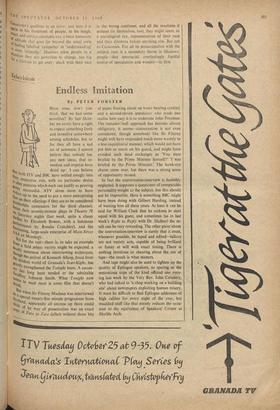T e le v i sio
Endless Imitation
By PETER FORSTER
HIGH time, don't you think, that we had some novelties? By late Octo- ber we surely have a right to expect something fresh and inventive somewhere among schedules, but so far they all have a sad air of sameness. I cannot believe that nobody has any new ideas, that in- vention and impetus have iloth ITV and BBC have settled smugly into w1r respective ruts, with no particular desire to - alter Patterns which each can justify as proving pretty successful. ATV alone seem to have 41°„_ken UP to the ,need to put a more enterprising Iv' on their offerings if they are to be considered urthwhii_ le contenders for the third channel; oenee their se venty-minute plays in Theatre 70 hSaturday nights (last week, quite a classy peiller by Elizabeth Bowen, with a luminous fa:torn-lance by Rosalie Crutchley), and the tise,inating, large-scale enterprise of Main Street Ou Mondays. fro ut for the rest—there is, to take an example a field where variety might be expected, a th'ilY sameness about interviewing techniques, though the arrival of Kenneth Alison, freed from .1.° strident world of Granada's Searchlight, has zoeratly strengthened the Tonight team. A succes- Ger,„has long been needed to the admirable tees'ill'reY Johnson Smith. What Tonight now breai:. to need most is some film that doesn't lnilaut when Sir Fitzroy Maclean was interviewed Se sPecial twenty-five minute programme from thintkland, apparently all anyone up there could conk of by way of presentation was an exact " of Face to Face (albeit without those bits
of paper floating about on water bearing credits), and a second-eleven questioner who made one realise how easy it is to underrate John Freeman. The matador/bull approach has become almost obligatory, it seems—conversation is not even considered, though somebody like Sir Fitzroy might well have responded much more warmly to a less inquisitorial manner, which would not have put him so much on his guard, and might have avoided such dead exchanges as 'You were briefed by the Prime Minister himself?' I was briefed by the Prime Minister.' The hawk-eye charm came over, but there was a strong sense of opportunity missed.
In fact the conversation-interview is foolishly neglected. It supposes a questioner of comparable personality-weight to the subject, but this should not be impossible. Here is something BBC might have been doing with Gilbert Harding, instead of wasting him all these years. At least it can be said for William Clark that he reckons to start equal with his guest, and sometimes (as in last week's Right to Reply with Dr. Dichter) the re- sult can be very rewarding. The other point about the conversation-interview is surely that it must, whenever possible, be taped and edited—talkers are not variety acts, capable of being brilliant or funny at will with exact timing. There is nothing invidious or cheating about the, use' of tape—the result is what matters.
And tape might also be used to tighten up the quality of Epilogue speakers, so sparing us the sententious tripe of the kind offered one even- ing last week by the Very Rev. John Coventry, who had talked to `a chap working on a building site' about newspapers exploiting human misery. It must be difficult to find Epilogue addresses of high calibre for every night of the year, but muddled stuff like that merely reduces the occa- sion to the equivalent of Speakers' Corner at Marble Arch.


















































 Previous page
Previous page